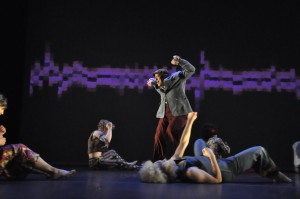Political Scientist Dominic Tierney and Nell Bang-Jensen ’11 recently led a discussion on the media’s responsibilities in times of war.
The discussion followed The Body of An American, which explores the friendship of photojournalist Paul Watson and playwright Dan O’Brien (played by Harry Smith and Ian Merrill). Photo by Alexander Iziliaev.
Swarthmore’s zeal for interdisciplinary studies and collaboration took center stage at the Wilma Theater earlier this month, when Associate Professor of Political Science Dominic Tierney and Nell Bang-Jensen ’11 guided a lively discussion on the media’s responsibilities in times of war.
The discussion followed a performance of The Body of an American, which explores the international repercussions of the Pulitzer Prize-winning photograph of a dead American soldier being dragged through the streets of Mogadishu, Somalia. The image skewed the perception of the U.S. intervention in Somalia and may have dissuaded its leaders from intervening in catastrophes such as Rwanda, Tierney says.

Nell Bang-Jensen ’11 cites collaborating with Dominic Tierney and other Swarthmore community members as “a wonderful melding of worlds.”
“The play deals with important issues about the power of photographs in wartime, which resonates with my teaching and research,” says Tierney, a senior fellow at the Foreign Policy Research Institute and an official correspondent of The Atlantic. “I was excited to participate.”
One of the actors in the play, Harry Smith, is a friend of Tierney’s. He recommended him as someone who had researched the events in Mogadishu and could lend context to the performance. In what Bang-Jensen deems a “funny coincidence,” it was she who called Tierney to arrange the collaboration.
“I sent him the script in advance so he could get a feel for it and see the connections to his own work,” says Bang-Jensen, who works in the Wilma’s artistic department. “There are different levels on which to interpret the play: How do we come to terms with the idea that war lives inside all of us, and how can we solve these internal wars before we can solve global ones?”
The play centers on photojournalist Paul Watson, who is haunted by what he believes he heard the soldier say right as he took the prize-winning photo: “If you do this, I will own you forever.” Playwright Dan O’Brien, also obsessed with the notion of hauntings, heard Watson tell the story on the radio in 2007, and a friendship bloomed between them. Written by O’Brien and directed by Michael John Garcés, the production runs through February 1.
Tierney’s appearance followed the January 16th performance, which drew a young and socioeconomically diverse audience (thanks partly to the WynTix program that offers $10 tickets to students and theater employees). With the Charlie Hebdo attack in France fresh on everyone’s minds, the audience pondered the media’s obligation to citizens.
“It’s the constant question of how the media can give outsiders a more nuanced view of what’s happening,” says Bang-Jensen, “going beyond these images that often only tell one part of the story.”
Also lending context to the performance was an exhibit of wartime photography in the lobby. It included the work of David Swanson, an embedded correspondent for the Philadelphia Inquirer in Iraq in 2004 and the husband of Laila Swanson, assistant professor in set and costume design for Swarthmore’s Department of Theater.
Swarthmore’s connections to the Wilma don’t end there, however. Madeline Charne ’14 has been an intern at the theater since June, and Matt Saunders, assistant professor of design and resident set designer, has designed sets for its productions such as Age of Arousal and Angels in America.
“I feel very lucky to be a part of this wonderful melding of worlds,” says Bang-Jensen, who majored in English literature with a theater minor at Swarthmore and then traveled for a year as a Watson Fellow. “It’s so exciting to engage these fellow artists at the professional level, and for these academic conversations to carry beyond the classroom and manifest as art.”








